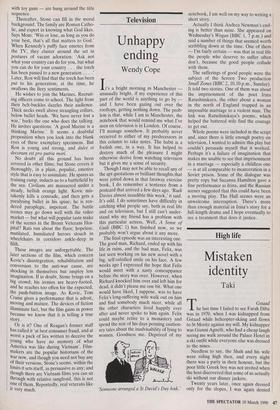Television
Unhappy ending
Wendy Cope
It's a bright morning in Manchester unusually bright, if my experience of this part of the world is anything to go by and I have been gazing out over the rooftops, getting nothing down. The prob- lem is that, while I am in Manchester, the notebook that would remind me what I've seen on television is in London. Of course, I'll manage somehow. It probably never occurred to either of my predecessors in this column to take notes. The habit is a foolish one, in a way. It has helped to destroy much of the pleasure I might otherwise derive from watching television but it gives me a sense of security.
Though I may not be able to recall any of the apt quotations or brilliant thoughts that were jotted down in that faraway exercise book, I do remember a sentence from a postcard that arrived a few days ago. audi Davies almost inaudible this week,' it said. It's odd. I do sometimes have difficulty in catching what people say, both in real life and on television, but I still can't under- stand why my friend has a problem with this particular actress. Well, A Sense of Guilt (BBC 1) has finished now, so we probably won't argue about it any more. The final episode was an interesting one The good man, Richard, ended up with his life in ruins, and the bad man, Felix, was last seen working on his new novel with a big, self-satisfied smile on his face. A few weeks ago I expressed the hope that Felix would meet with a nasty comeuppance before the story was over. However, when Richard knocked him over and left him for dead, it didn't please me one bit. What one would have liked, I suppose, was to have Felix's long-suffering wife walk out on him and find somebody much nicer, while all the other characters lived happily ever after and never spoke to him again. Felix could maybe retire to a monastery and spend the rest of his days penning caution- ary tales about the inadvisability of lying to women. Goodness me. Deprived of my `Someone arranged a St David's Day leak.' notebook, I am well on my way to writing a short story.
Actually I think Andrea Newman's end- ing is better than mine. She appeared on Wednesday's Wogan (BBC 1, 7 p.m.) and said a number of things that seemed worth scribbling down at the time. One of them — I'm fairly certain — was that in real life the people who deserve to suffer often don't, because the good people collude with them.
The sufferings of good people were the subject of the Screen Two production Small Zones (BBC 2, 10.10 p.m., Sunday). It told two stories. One of them was about the imprisonment of the poet Irina Ratushinskaya, the other about a woman in the north of England trapped in an impossible marriage to a violent man. The link was Ratushinskaya's poems, which helped the battered wife find the courage to get out.
Whole poems were included in the script and, since there is little enough poetry on television, I wanted to admire this play but couldn't persuade myself that it worked. Perhaps it's a failure of imagination that makes me unable to see that imprisonment in a marriage — especially a childless one — is at all comparable to incarceration in a Soviet prison. Some of the dialogue was pretty ropy but Suzanna Hamilton gave a fine performance as Irina, and the Russian scenes suggested that this could have been a moving play. The Hull scenes were an unwelcome interruption. There's more than enough material in Irina's story for a full-length drama and I hope eventually to see a treatment that does it justice.


























































 Previous page
Previous page